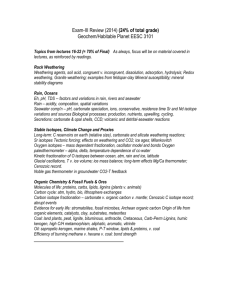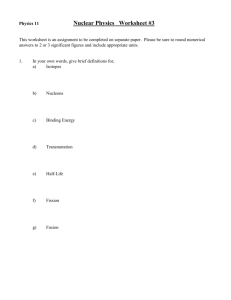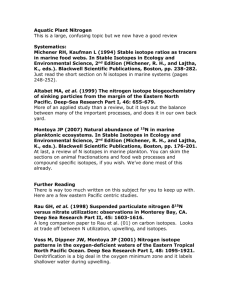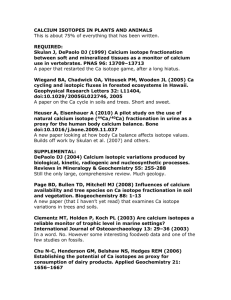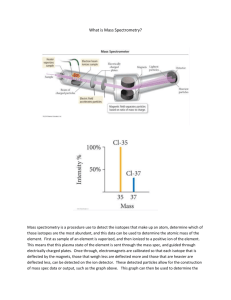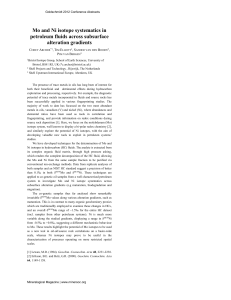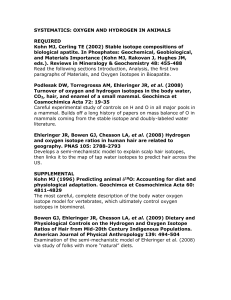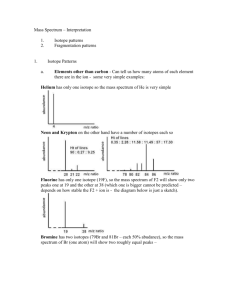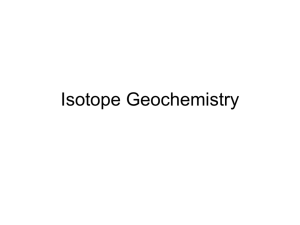Course Name: Isotope Geology and Geochronology
advertisement
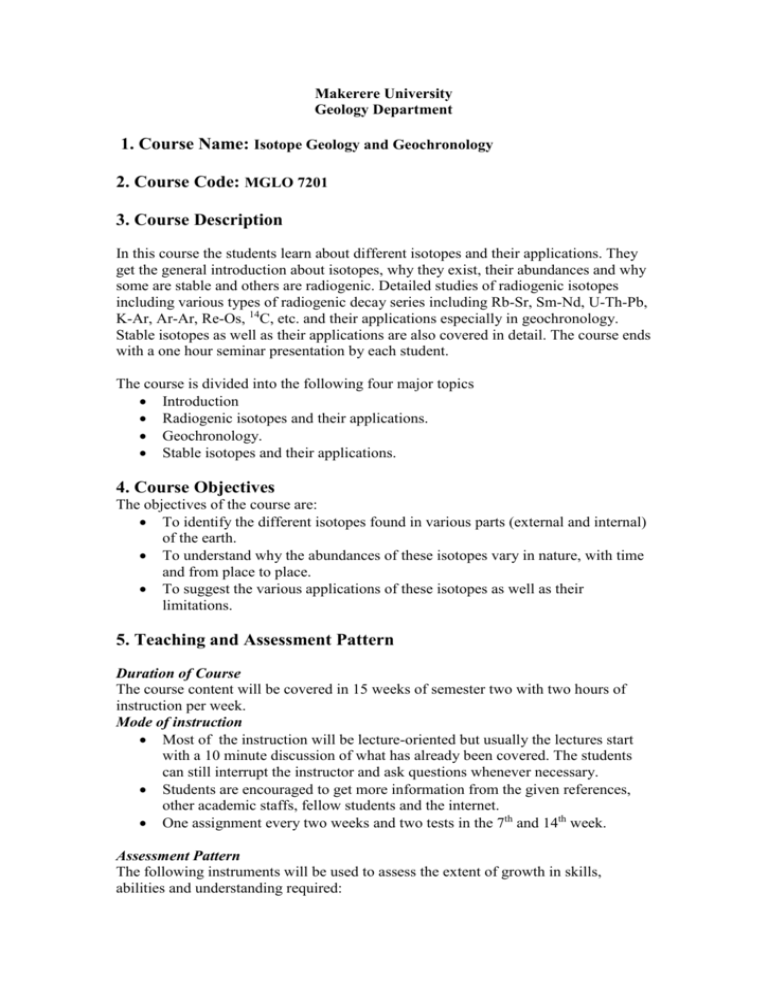
Makerere University Geology Department 1. Course Name: Isotope Geology and Geochronology 2. Course Code: MGLO 7201 3. Course Description In this course the students learn about different isotopes and their applications. They get the general introduction about isotopes, why they exist, their abundances and why some are stable and others are radiogenic. Detailed studies of radiogenic isotopes including various types of radiogenic decay series including Rb-Sr, Sm-Nd, U-Th-Pb, K-Ar, Ar-Ar, Re-Os, 14C, etc. and their applications especially in geochronology. Stable isotopes as well as their applications are also covered in detail. The course ends with a one hour seminar presentation by each student. The course is divided into the following four major topics Introduction Radiogenic isotopes and their applications. Geochronology. Stable isotopes and their applications. 4. Course Objectives The objectives of the course are: To identify the different isotopes found in various parts (external and internal) of the earth. To understand why the abundances of these isotopes vary in nature, with time and from place to place. To suggest the various applications of these isotopes as well as their limitations. 5. Teaching and Assessment Pattern Duration of Course The course content will be covered in 15 weeks of semester two with two hours of instruction per week. Mode of instruction Most of the instruction will be lecture-oriented but usually the lectures start with a 10 minute discussion of what has already been covered. The students can still interrupt the instructor and ask questions whenever necessary. Students are encouraged to get more information from the given references, other academic staffs, fellow students and the internet. One assignment every two weeks and two tests in the 7th and 14th week. Assessment Pattern The following instruments will be used to assess the extent of growth in skills, abilities and understanding required: Requirements Tests Assignment Class discussions PA Final exam Contribution 25% 10% 5% 40% 60% Total 100% All scores will then be converted to letter grades using the system shown below: Marks % 80-100 75-79.9 70-74.9 65-69.9 60-64.9 55-59.9 50-54.9 45-49.9 40-44.9 35-39.9 Below 35 Letter Grade A B+ B BC+ C CD+ D DE Grade Point 5 4.5 4.0 3.5 3.0 2.5 2.0 1.5 1.0 0.5 0 6. Reading List The reading list will include but not limited to the following: Faure, G. 1986. Principles of Isotope Geology, 2nd Ed. 589p. John Wiley and sons, New York. Gebauer, D., Grunenfelder, M., 1979. U-Th-Pb dating of minerals. Lectures in isotope geology, Jager, E., Hunzeiker, J. C., Ed. Pp 105-131. Springer-verlag, Berlin Heidelberg, Germany. White, W. M., 1997. Geochemistry. Lecture notes by B. Nagudi. 7. Course Outline Introduction Definition of an isotope, isotope geology and geochronology. Radioactive decay and fundamental assumptions, stable isotopic fractionation. Nuclear structure and energies. Stability of various nuclei based on some combinations of neutrons and protons. Distribution of stable nuclei. Radiogenic Isotopes Definition. Characteristics. Decay of excited and unstable nuclei. Types of radioactive decay. Applications of radiogenic isotopes and limitations. Geochronology Definition. Derivation of the half-life equation and its derivatives. Decay systems and their applications. Stable isotopes Definition. Characteristics. Fractionation, fractionation factor , the delta value . Characteristics of a standard. Relationship between and . Equilibrium isotope fractionation, processes involved in isotope fractionation. Isotope fractionation in a hydrologic system, biologic system, magmatic system. Applications and limitations. 8. Suggested Teaching Program I. Introduction 2 weeks Assignment 1 Definition of an isotope, isotope geology and geochronology. Radioactive decay and fundamental assumptions, stable isotopic fractionation. Nuclear structure and energies. Stability of various nuclei based on some combinations of neutrons and protons. Distribution of stable nuclei. 4 weeks II. Radiogenic Isotopes Definition. Characteristics. Decay of excited and unstable nuclei. Types of radioactive decay. Applications of radiogenic isotopes and limitations. Test 1 Assignment 2 and 3 4 weeks Assignments 4 and 5 III. Geochronology Definition. Derivation of the half-life equation and its derivatives. Decay systems and their applications. IV. Stable isotopes 4 weeks Assignment 6 Definition. Characteristics. Fractionation, fractionation factor , the delta value . Characteristics of a standard. Relationship between and . Equilibrium isotope fractionation, processes involved in isotope fractionation. Isotope fractionation in a hydrologic system, biologic system, magmatic system. Applications and limitations. V. Seminar 1 week Seminar presentation 9. Responsibility of the students Regular attendance, do all assignments, tests and attend all seminar presentations, participate in all class discussions. 10. Responsibility of the course lecturer Regular and punctual teaching, provide lecture notice, accurate and prompt grading of course work and examinations, assist students after formal lectures.
![tutorial #14 [nuclear physics and radioactivity] .quiz](http://s3.studylib.net/store/data/008407305_1-1884988a9e5162a6b7a2b0d0cf8c83c5-300x300.png)
